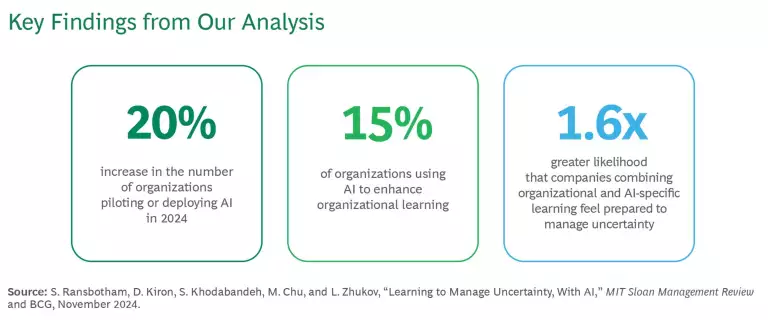Geopolitical tensions, changing consumer preferences, talent disruptions, shifting regulations, and fast-evolving technologies like AI are rapidly altering the business landscape, resulting in uncertainty for companies. Identifying, understanding, adapting, and learning from this new environment is the key to success. But how do organizations keep up? Increasingly, they’re turning to AI to increase their learning abilities.
What are the implications of incorporating AI into companies’ learning? Our research shows that companies that combine organizational learning and AI-specific learning perform better than peers that do not, improving not only financial results but also the ability to manage uncertainties. That insight comes from a global survey of more than 3,400 respondents conducted by MIT Sloan Management Review, BCG Henderson Institute , and BCG X to better understand the relationship between organizational learning, AI-specific learning, and the ability to manage rapidly changing conditions. (See the sidebar.)
Organizational learning & AI-specific learning definition
AI-specific learning: The measure of organizations’ use of AI for learning.
Global survey results established the relationship between organizational learning and AI. They also revealed that 70% of companies have adopted AI (versus 50% in 2023), but thus far only 15% are using it for organizational learning. That gap leaves room for appreciable performance gains for the vast majority of organizations. We found that companies incorporating AI into their learning capabilities show clear improvement over peers that do not in their response to a range of internal and external uncertainties—from talent mobility to new technology and related regulations. (See the exhibit.)

Combining strong organizational learning capabilities with AI-specific learning is more important than ever—not just for how organizations cultivate knowledge but also for how they deploy it to anticipate and respond to the unknown. Improving organizational learning outcomes makes companies better able to chart a strategic approach to uncertainty. When it comes to talent-related disruptions, for instance, our results showed that organizations that built AI into their learning practices are twice as prepared to manage talent-related disruptions than their peers and that they are 60% to 80% more likely to be effective at managing a volatile business landscape.
How can deploying AI improve organizational learning? There are three key areas where AI can significantly enhance an organization’s learning capacity: knowledge capture, the ability to turn vast quantities of information into useful knowledge; knowledge synthesis, the pulling together of internal and external data and making it digestible for users across the organization; and knowledge dissemination, a more personalized approach to getting the right information to the right person at the right time.
For executives, now that the link between AI and organizational learning is clear, the question is: How to get started?













